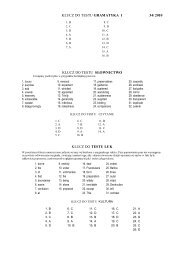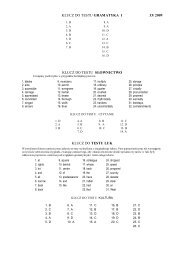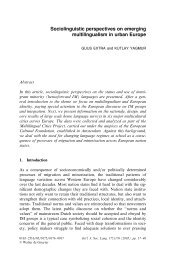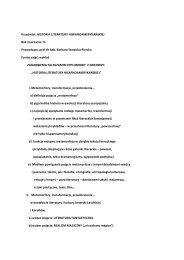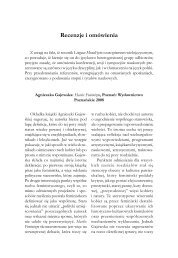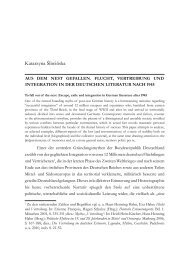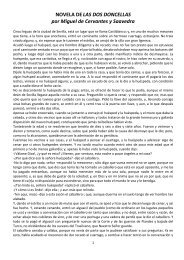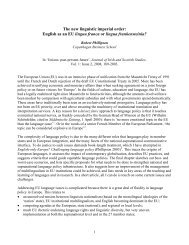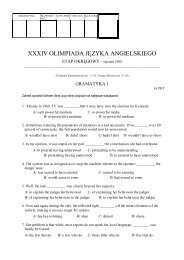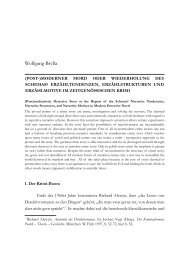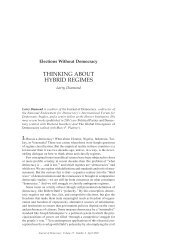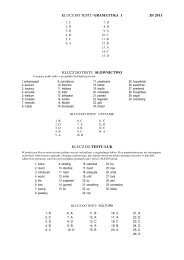African American women and feminism: Alice Walker's womanism ...
African American women and feminism: Alice Walker's womanism ...
African American women and feminism: Alice Walker's womanism ...
Create successful ePaper yourself
Turn your PDF publications into a flip-book with our unique Google optimized e-Paper software.
<strong>African</strong> <strong>American</strong> <strong>women</strong> <strong>and</strong> <strong>feminism</strong>: <strong>Alice</strong> Walker’s <strong>womanism</strong> as a proposition of a dialogic encounter 11<br />
<strong>African</strong> <strong>American</strong> <strong>women</strong>’s critical essays this paper demonstrates how <strong>Alice</strong><br />
Walker’s proposition of the womanist critical (<strong>and</strong> practical) perspective might<br />
serve the politics of reconciliation rather than radical separation from <strong>feminism</strong><br />
without the necessity to give up commitment to uphold the unity of the <strong>African</strong><br />
<strong>American</strong> community. The presented improvisational analysis of <strong>Alice</strong> Walker’s<br />
essay In Search of Our Mothers’ Gardens aims to demonstrate <strong>womanism</strong>’s potential<br />
of employing the politics of a friendly dialogue with <strong>feminism</strong> to both support<br />
feminist politics <strong>and</strong> assert its uniqueness by stressing <strong>womanism</strong>’s rootedness<br />
in <strong>African</strong> <strong>American</strong> tradition <strong>and</strong> culture.<br />
Locating <strong>African</strong> <strong>American</strong> <strong>women</strong>’s st<strong>and</strong>point<br />
Responding to the dominant <strong>and</strong> universalizing academic discourse of poststructuralist<br />
theory in the 1980s, Black feminist critic Barbara Christian articulated<br />
her disappointment with – <strong>and</strong> the feeling of being “intimidated, devalued” by<br />
– the intellectual hegemony of Euro-<strong>American</strong> abstract logic that surrounded the<br />
definition of knowledge in the academia . As a woman of color she felt excluded<br />
by what she called “the race for theory”, which she saw as the “takeover” of white<br />
philosophers who had “reinvented the meaning of theory”, seeing that the world<br />
was “fast escaping their political control” . According to her, the popularization<br />
of Western abstract theory as constitutive for the definition of knowledge in<br />
the academia was alien to emerging literatures created by people who struggled<br />
to be heard, that is people of color, feminists, radical critics <strong>and</strong> creative writers.<br />
Christian felt particularly discouraged by the incomprehensibility of the language<br />
of theory, its prescriptiveness <strong>and</strong> the tendency to relegate to a marginal position<br />
of “minority discourse” those <strong>African</strong> <strong>American</strong> writers for whom “literature is<br />
not an occasion for discourse among critics but is necessary nourishment of their<br />
people <strong>and</strong> one way by which they come to underst<strong>and</strong> their lives better” .<br />
In her critique of “the race for theory”, Christian also indicates that in their<br />
effort to follow the injunction to theorize – <strong>and</strong> thus legitimize their place in the<br />
academia – feminists exclude <strong>women</strong> of color who have always theorized, but<br />
their notion of theory does not necessarily converge with what is considered<br />
academic theory. Consequently, her statement: “my folk [...] have always been<br />
a race for theory” may be interpreted, on the one h<strong>and</strong>, as pointing to mar-<br />
<br />
B. Christian: The Race for Theory. In: <strong>African</strong> <strong>American</strong> Literary Theory: A Reader. Ed. W. Napier.<br />
New York <strong>and</strong> London: New York University Press, 2000, p. 280.<br />
<br />
B. Christian: The Race for Theory, op.cit., p. 280.<br />
<br />
B. Christian: The Race for Theory, op.cit., p. 282.<br />
<br />
Ibid.



